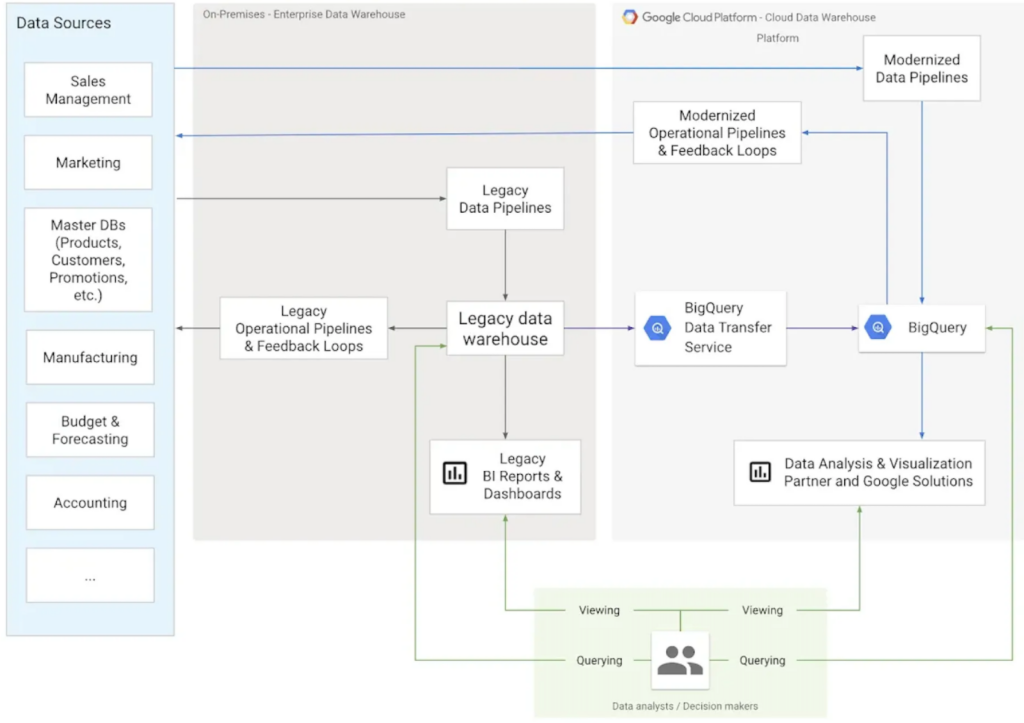
Data has become the lifeblood of organizations in every industry. Data engineering skills, generating predictive analytics, data security, and the capacity to store data are all at a premium. Sign up for SADA’s Data Crash Course, a series of presentations on data management with Google BigQuery, scheduled virtually from October 25 to November 15, 2023, to learn more about how you can implement a successful and far-reaching data strategy for your organization.
Before we get to the particulars of this information-rich series of sessions, let’s explore the state of today’s big data landscape.
Why data matters

For any organization conducting business in the cloud, data is akin to a valuable resource. The successful extraction, refinement, and application of data can lead to substantial growth, innovation, and competitive advantages. Here are a few reasons why managing data is critical for businesses:
- Informed decision-making: Data-driven decision-making has become the gold standard for businesses. Organizations that can swiftly analyze data and derive insights from their data are better equipped to make informed decisions, adapt to changing market conditions, and seize opportunities as they arise.
- Competitive advantage: Gaining a competitive edge often boils down to who can leverage data more effectively. Whether it’s optimizing operations, understanding customer behavior, or predicting market trends, data holds the key to staying ahead of the competition.
- Resource efficiency: Effective data management can lead to resource efficiency. By streamlining data processes, companies can reduce operational costs, minimize data redundancy, and maximize the utility of their existing infrastructure.
Let’s take a closer look at three main benefits of using BigQuery in your data management strategy.
Benefits of BigQuery

BigQuery is a cloud-based, fully managed serverless data warehouse with built-in capabilities that offer several advantages to organizations:
- Speed and scalability: BigQuery is designed for speed. It allows you to run SQL-like queries on massive datasets in seconds, enabling real-time analysis and decision-making. Its serverless architecture means you can scale resources up or down as needed, ensuring you only pay for what you use.
- Ease of use: BigQuery offers a user-friendly interface that makes it accessible to specialists like data scientists, data analysts, and data engineers as well as business users. You don’t need to worry about infrastructure management, and the platform seamlessly integrates with popular business intelligence tools, making data analysis and visualization a breeze.
- Advanced analytics: BigQuery isn’t just great for storing data; it’s a robust analytics platform. With built-in machine learning capabilities and the ability to analyze raw data, geospatial data, streaming data, and more, it empowers your organization to extract deeper insights and discover hidden patterns within your data.
SADA’s Data Crash Course sessions

SADA’s Data Crash Course offers the right combination of context and deep dives into everything from building data pipelines to data governance, data lakes, and data warehouses. Be sure to come with plenty of questions and be prepared to elevate your data engineering game in the following sessions.
Session 1: Introduction to the Data Cloud
In this session, you’ll dive deep into Google Data Cloud, a suite of tools designed to transform data into actionable insights. The session will cover key features of Data Cloud, updates from Google Cloud Next 2023, platform components, and reference architectures.
This session is essential because it sets the foundation for understanding how Google Cloud data solutions can be leveraged to gain a competitive advantage. Staying ahead of the curve means knowing how to access data and make data-driven decisions. This session provides the knowledge to get started.
Session 2: Data Visualization
Data visualization is a crucial aspect of data management. In this session, you will learn how to unlock the power of data with interactive dashboards using Looker. Then, explorations of Looker Studio/Pro, Notebooks, Connected Sheets, and BI Engine provide you with the tools to create visually compelling and informative reports and dashboards.
Effective data visualization can help your businesses communicate insights more effectively and enable data-driven decision-making. In an era where data is abundant but attention spans need direction, the ability to present data in a clear and compelling way is a skill that’s always in high demand.
Session 3: Resource Management
Proper resource allocation and utilization are pivotal for organizations looking to maximize the value of their data. This session will cover concepts such as slots, reservations, hierarchies, cost optimization, editions, autoscaling, and more. You’ll gain insights into how to manage your resources efficiently to enhance performance, scalability, and cost-effectiveness.
Resource management is often an overlooked aspect of data management, but it can significantly impact your organization’s bottom line. By understanding how to optimize resource usage, you can ensure that you’re getting the most value from your data investments.
Session 4: Data Ingestion
The final session of the Crash Course explores data ingestion, a critical component of any data management strategy. You’ll discover how Google’s Data Cloud facilitates swift and reliable data ingestion, enabling businesses to fuel analytics, machine learning models, and decision-making processes with timely and accurate data. Topics covered include stream vs. batch, sources within GCP, GCP-native vs. partner solutions, and multicloud ingestion.
Data ingestion is the starting point of your data journey. Without efficient and reliable data ingestion processes, organizations risk working with outdated or incomplete data, which can lead to flawed data analysis. This session equips you with the knowledge to ensure data is ingested effectively.
Find out why big data is a big deal

SADA’s Data Crash Course on BigQuery promises to be a valuable opportunity for anyone seeking to take their business intelligence strategy to the next level and enhance their data management skills, from seasoned data analysts to software engineers and business leaders. Understanding how to harness the power of BigQuery can be a game-changer.
Whether you’re interested in data analytics, visualization, resource management, or data ingestion, this crash course offers a comprehensive and insightful journey into the world of Google’s Data Cloud. Don’t miss the chance to learn from leading Google Cloud experts and gain the knowledge necessary to create a custom enterprise-grade data environment for your organization. Sign up today and stay ahead of the competition in the data-driven future.



